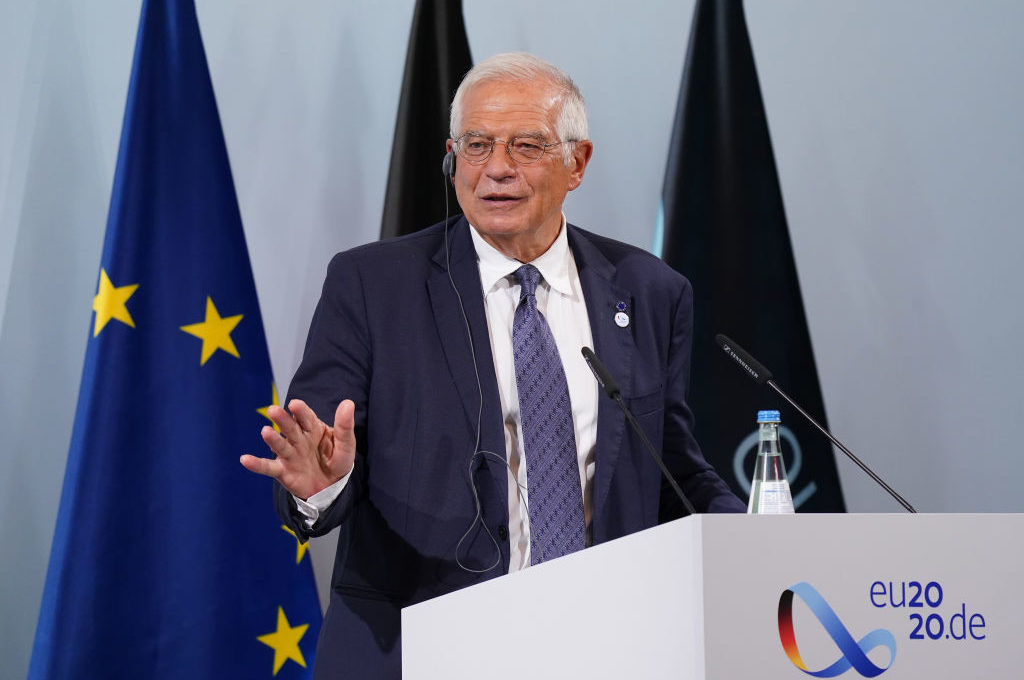This week, Hungary defied Brussels and refused to back a joint EU declaration on the Israeli-Palestine conflict. The bland EU statement calling for an end to the violence was underwhelming in itself — but with Hungary rejecting the bloc’s ‘one-sided’ approach, Brussels has been left embarrassed by its inability to coordinate a unanimous response to the fighting.
The proposed statement from the bloc’s foreign affairs chief Josep Borrell read, ‘the priority is the cessation of all violence and the implementation of a ceasefire’, and said that:
‘…we support the right to defense for Israel and the right to security — also for the Palestinians — and we consider that security for Israel and Palestine requires a true political solution’.
Hungarian foreign minister Peter Szijjarto justified Hungary’s decision not to back the declaration by citing ‘a general problem with European statements on Israel’, which he claimed ‘do not help, especially in the current circumstances, when the tensions are so high’.
Hungary’s support for Israel comes as no surprise. Viktor Orbán’s Fidesz government has long been a staunch ally of Israel, and although anti-government media in Hungary claim the alliance is a political ploy intended to distract from anti-Semitic rhetoric peddled by Fidesz at home, the two nations often seem linked by their combined desire to protect themselves against international forces. Peter Szijjarto has described Israel and Hungary as the two nations most persecuted by international organizations and media — only this week Orbán claimed that Hungarians suffer ‘spectacular discrimination’ within the EU.
This ideological camaraderie between Hungary and Israel was underscored in 2019 by Hungary’s decision to become the first EU member state to open an official diplomatic office in Jerusalem, having previously vetoed an EU statement condemning Donald Trump’s relocation of the US embassy to the Holy City. And in December 2020, defense ties between the two countries were cemented by Hungary’s procurement of Israel’s famous Iron Dome air defense system.
Yet Hungary’s is not the only country in Central Europe to publicly support Israel in the current conflict. The outspoken Czech president Miloš Zeman flew an Israeli flag at Prague Castle on Friday, having earlier sent a message to Israeli president Reuven Rivlin expressing the Czech Republic’s ‘full support and solidarity’ with Israel. The Czech Republic is another long-term ally of Israel — in 2018, Netanyahu said his country ‘has no greater friend in the eastern hemisphere’ than the Czech Republic. Zeman has described Hamas as a ‘terrorist organization’, and in 2020 condemned members of his own government for criticizing Israeli plans to annex settlements in the West Bank.
In Austria, the Israeli flag was flown atop the chancellery and foreign ministry in Vienna on Friday, while the German government has condemned Hamas and supported Israel’s right to self-defense — foreign minister Heiko Maas said that ‘Israel defends itself because it has to’. Such regional support shows that, although Hungary stood alone in blocking the joint EU statement, the country is by no means isolated when it comes to its stance on the Israeli-Palestine conflict.
Instead, Hungary’s rejection of the declaration is further evidence of its refusal to allow its ideological positions to be watered down by differing opinions inside the bloc. For the EU, this independent attitude has already caused significant problems on issues ranging from the EU’s post-pandemic recovery budget to LGBT rights — and it now leaves the bloc looking divided and impotent at a crucial juncture on the international stage. The EU is Israel’s biggest trading partner, but it lacks the unanimity which could have given it a powerful hand in peace-making attempts. European commentators have been left wringing their hands at Brussels’s inability to exert an influence on the conflict.
Yet the EU’s problem runs much deeper than a single rogue member state. With many pro-Israel and pro-Palestine members acting independently to express their support for one side or the other in the conflict (several Belgian lawmakers proposed travel bans and asset freezes on Israeli politicians in response to the violence), the EU’s equivocal response seems to be more of an exercise in internal diplomacy — a mere attempt to paper over internal cracks in foreign policy — than a clear and assertive stance on the international stage. It would be impossible for the bloc to take a firm stance on either side of the debate without alienating some of its member states — but by attempting to reach a position which leaves no member feeling betrayed, it is left permanently sitting on the fence.
Other governments have taken equivocal stances on the conflict too, but the EU’s messy, divided response is particularly embarrassing. Having this month discussed the formation of a rapid reaction force following the loss of Britain’s military presence within the bloc, this would have been a good opportunity for the EU to show itself as decisive in matters of foreign policy. Instead, a ponderous, divided, and ultimately impotent reaction to the Israeli-Palestine conflict has been something of a humiliation for the bloc.
This article was originally published on The Spectator’s UK website.

























